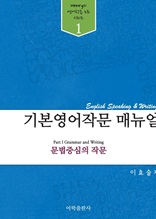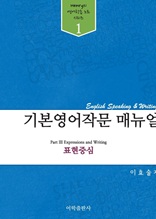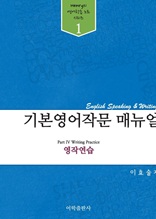머리말 (Preface)
영어식 사고 (Thinking in English)
PART II 패턴중심
1. 제 1 형식 (S + V[M])
2. 제 2 형식 (S+V+C[M])
3. 제 3 형식 (S+V+O[M])
4. 제 4 형식 (S+V+I.O+ D.D [M])
5. 제 5 형식 (S+V+O+ O.C [M])
6. 제 6 형식 무생물 주어
7. 제 7 형식 특수 주어 it
8. 제 8 형식 형식상의 주어 it (1)
9. 제 9 형식 형식상의 주어 it (2)
10. 제 10 형식 강조구문
11. 제 11 형식 SV + O (=부정사)
12. 제 12 형식 SV + O (=동명사)
13. 제 13 형식 SV + 명사절
14. 제 14 형식 주어+동사+ it (가목적어) + to 부정사~(또는 that~)
15. 제 15 형식 전치사가 목적을 취하는 경우
16. 제 16 형식 SV + C (=to 부정사)
17. 제 17형식 SV + C (=분사)
18. 제 18 형식 SVO + C (=to 부정사)
19. 제 19 형식 SVO + C (=분사)
20. 제 20 형식: SV+ C (구 또는 절)
21. 제 21 형식 SVO + C (구 또는 절)
22. 제 22 형식 It is no use (or good) ~ing (동명사)
23. 제 23 형식 why 앞에 the reason이 생략 된 것이며, how 앞에는 the way가 생략된 형식임.
24. 제 24 형식 명사+ be동사+형용사+enough to + 동사원형
25. 제 25 형식 so ~as to…(명사 + be동사 so 형용사 as to 동사원형)
26. 제 26 형식 so ~ that… (such that) (명사 + be동사 so 형용사 that…)
27. 제 27 형식 too ~ to…(명사 + be동사 too 형용사 (for + (대)명사) to 동사원형)
28. 제 28 형식 as ~as…
29. 제 29 형식 times as ~ as….
30. 제 30 형식 more (형용사의 비교급) ~ than…
31. 제 31 형식 Nothing is more 형용사 (또는 형용사의 비교급) than…
32. 제 32 형식 부정어 ~ 비교급 ~ than….
33. 제 33 형식 부정어 ~ 비교급 ~ than…be the 최상급 + 명사 (that)~
34. 제 34 형식 비교급 and 비교급
35. 제 35 형식 the 비교급…….the 비교급
36. 제 36 형식 all the 비교급
37. 제 37 형식 be more of a + 명사 than 명사
38. 제 38 형식 of 추상명사= 형용사
39. 제 39 형식 at rest; at work; on show 등
40. 제 40 형식 ….be busy ~ing; be worth ~ing; be slow (in) ~ing
41. 제 41 형식 be ignorant of~; be afraid of ~ etc.
42. 제 42 형식 be superior to ~; equal to~; familiar to~ 등
43. 제 43 형식 I ran into a friend of mine the other day. 등
44. 제 44 형식 The letter brought about ~, 등
45. 제 45 형식 catch up with~ (~을 따라잡다.), 등
46. 제 46 형식 inform someone of~, 등 (~을 알리다. 등)
47. 제 47 형식 He succeed in (college entrance exam.)
48. 제 48 형식 동족목적어
49. 제 49 형식 재귀대명사
50. 제 50 형식 easy of~ 등, (…..가 ~이다.)
51. 제 51 형식 be praised by~ 등 (~에 의해서 ~되다.)
52. 제 52 형식 relied upon by~ 등 (~에 의하여 ~되다.)
53. 제 53 형식 To see is to believe. 등 (~하는 것이 ~이다.)
54. 제 54 형식 Seeing is believing. 등 (~하는 것은 ~이다.)
55. 제 55 형식 To know is one thing, to teach is another. 등 (~하는 것과 ~하는 것은 다르다.)
56. 제 56 형식 All have to do is to do as I am told. 등
57. 제 57 형식 My purpose is to pass the exam. 등
58. 제 58 형식 be to +동 (~을 할 수 있다, ~할 예정이다, ~해야 한다, ~할 운명이다.)
59. 제 59 형식 Elders are apt to forget. 등 (~은 잘 ~하다.(등))
60. 제 60 형식 be going to~ (~하다. ~할 예정이다)
61. 제 61 형식 She is said to be pretty. 등 수동형
62. 제 62 형식 He is the last person to tell a lie. (절대 거짓말 할 사람이 아니다)
63. 제 63 형식 The fact is that…. (….은 ~ 다.)
64. 제 64 형식 What I have learned is that… (~은…..이다.)
65. 제 65 형식 I am sure that~. 등 (~을 ….하다.)
66. 제 66 형식 There is no rule but has exceptions. 등 (~가 없는 ~은 없다.)
67. 제 67 형식 There is no need to try it again. 등 (~하는…가 있다.)
68. 제 68 형식 There is a saying that time is money. 등(~하는…가 있다.)
69. 제 69 형식 There is no doubt about it. 등 (~가 없다. ~할 수 없다.)
70. 제 70 형식 There seems to be some reason for that. (~인 것 같다.)
71. 제 71 형식 There used to be a traditional Korean-style house. 등 (~가 있었다.)
72. 제 72 형식 get rid of~ 등(~을 버리다. ~을 고치다.)
73. 제 73 형식 have a liking… 등(have 동사를 가진 관용구)
74. 제 74 형식 have the opportunity to~ 등 (기회가 있다.)
75. 제 75 형식 have something to do with~(~와 관계가 있다.) 등
76. 제 76 형식 have only to~(~하기만 하면 된다. 아직 ~하지 않다.)
77. 제 77 형식 do not have to~(~할 필요가 없다.)
78. 제 78 형식 It may be that~(~일 가능성이 많다.)
79. 제 79 형식 may well say ~(~하는 것은 당연하다. ~하는 편이 좋다.)
80. 제 80 형식 may as well……as~(~하기 보다….하는 것이 더 낫다.)
81. 제 81 형식 It would be. . . to~ (~하는 것은 . . .일 것이다.)
82. 제 82 형식 It would have been~ (~했으면 ~했을 것이다.)
83. 제 83 형식 주어+would not have+pp~(. . .라면 ~했을 것이다.)
84. 제 84 형식 To master English, we must practice it incessantly. (~하기 위해서는, ~해야 한다.)
85. 제 85 형식 I cannot see her without recalling her mother. 등 (~하면 반드시 ~하다.)
86. 제 86 형식 It will not be long before the boy comes back from school. 등 (오래지 않아 ~할 것이다.)
87. 제 87 형식 We cannot estimate the value of time too much. 등 (아무리~해도 지나치지 않다.)
88. 제 88 형식 도치구문 (Inversion)
89. 제 89 형식 생략구문 (Ellipsis)
90. 제 90 형식 삽입(Parenthesis)
91. 제 91 형식 공통관계 (Common Relation)
92. 제 92 형식 동격 (Apposition)
93. 제 93 형식 명사 중심 구문에서의 SV관계
94. 제 94 형식 He is a good swimmer. (그는 수영을 잘 한다.)
95. 제 95 형식 가정법에서 if 절 외에 명사 또는 명사 상당어구(동명사, 명사구 등)가 if절 역할을 하는 경우.
도서소개
저자소개
목차소개









